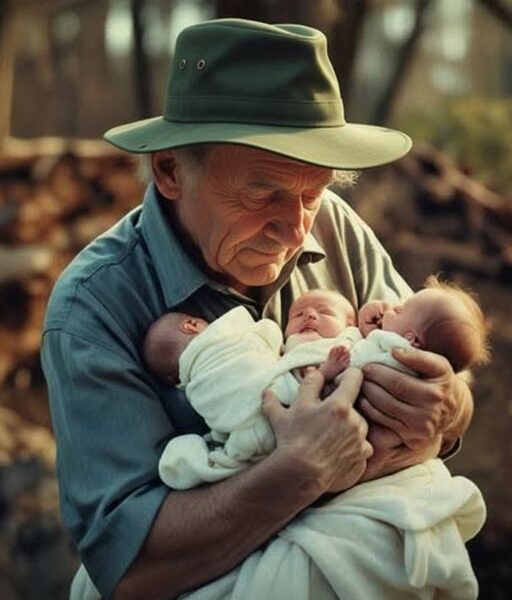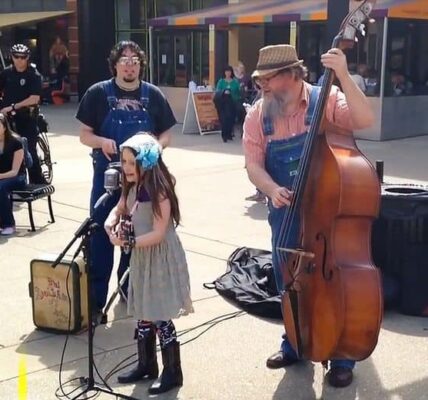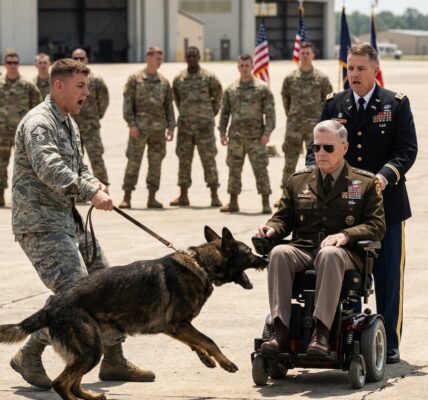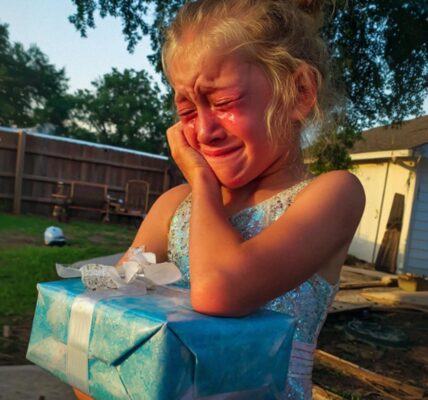An Elderly Farmer Found Three Abandoned Babies On His Land—But One Was Wearing A Gold Bracelet
The sun was barely rising over the mountains surrounding the small homestead where John Peterson lived, a seventy-year-old man who had dedicated his entire life to the land. His face, etched with deep wrinkles and a reserved smile, reflected the wisdom and sacrifices accumulated over decades of work.
That morning, like many others, he set out early with Bella, his faithful dog—a mutt with bright eyes who never left his side. The fog still covered the field when John noticed that Bella, usually calm, suddenly began to bark and agitate, pointing towards a small grove at the edge of the property.
— What’s wrong, Bella? — he asked in his hoarse voice, following the dog.
The air grew colder as they advanced into the grove. Bella ran ahead and stopped near a bush. From there, a faint cry broke the silence.
John’s heart pounded as he approached and carefully parted the branches. To his astonishment, he saw three babies, wrapped in tattered blankets and placed on a makeshift bed of dry leaves.
— Dear God! — he murmured, bending down to ensure the little ones were breathing.
They were two girls and a boy. They appeared exhausted, their cheeks red from the cold, and their small bodies shivering.
The old man, paralyzed by shock, looked around, searching for someone or at least a clue about who could have left them there.
— Who could do such a thing? What kind of scoundrels?! — he whispered, running his trembling hands over his face.
The dog looked at him with a sort of urging, as if telling him to act.
John sighed deeply and carefully took the three babies into his arms, wrapping them in his old wool coat… and then he froze, seeing something unusual.
The boy—barely bigger than the girls—had a thin gold bracelet around his wrist. Engraved, in almost microscopic cursive, were the letters: “A.M.V.”
John’s heart clenched. It was too deliberate to be random. Someone had wanted that bracelet to be seen, to say something. He didn’t know what yet, but he had no time to stand there thinking.
He rushed back to the house with the babies cradled tight, Bella at his heels.
Once inside, he lit the stove, turned on the old electric heater, and laid the babies on his worn couch, wrapping them in wool blankets.
The phone sat silent on the counter, still plugged into the wall like always. But John hesitated.
He could call the sheriff. It would be the logical thing. But something in his gut told him to wait—just for a little. Maybe it was the look on that boy’s face. Or maybe it was the bracelet.
Instead, he made warm formula from powdered milk and the bottles his late wife had kept boxed in the attic. They had lost their only daughter, Milena, decades ago—SIDS, they said. Never had more children. But Marisol had refused to throw the baby things away.
John had never imagined he’d use them again.
By nightfall, the babies had calmed. They were quiet, fed, and dry. John barely slept, waking every hour to check on them.
The next morning, he loaded them carefully into the backseat of his truck, bundled up like potatoes, and drove into the nearby town of Silver Creek. It was a small mountain town—everybody knew everybody.
At the sheriff’s office, he stopped just outside. Then something odd happened.
A woman, maybe in her thirties, came out of the bakery across the street and paused when she saw the truck. Her eyes locked with John’s for a split second—and then widened in recognition.
John didn’t think much of it until he turned back to the babies.
The bracelet was gone.
Panic gripped him. He tore through the blankets, searching, but it had vanished.
He left the truck running and bolted into the bakery.
The woman was gone.
The barista, a young guy with messy hair and flour on his apron, shrugged when John asked about her.
— She just grabbed a coffee and left. Didn’t say much.
Back in the truck, John drove straight to the sheriff’s office, filled with unease.
Sheriff Morales was a decent man, if a little by-the-book. His eyes went wide at the sight of the babies.
They took John’s statement, logged the blankets as evidence, and called social services.
But something about Morales’s tone changed when John mentioned the bracelet.
— “A.M.V.?” — he repeated slowly. — Are you sure that’s what it said?
— I know what I saw. It was gold, with tiny letters.
The sheriff scribbled something down, then said they’d launch an investigation. But John knew that tone. That pause.
They knew something.
Social services placed the babies with emergency foster families. John hated every second of handing them over. He asked for updates, even offered to take them himself, but they said he was too old.
Weeks passed. Then one afternoon, Sheriff Morales came knocking.
He had a file in his hands and a strange look on his face.
— We got something. You’re not gonna believe it.
Turns out, a baby boy named Arman Mikhail Volkov had been declared missing three months earlier in a wealthy suburb two counties away.
The parents? Roman and Elvira Volkov—Ukrainian immigrants who’d made their fortune in rare gem exports. The kind of people who had money… and enemies.
They reported their son missing during a supposed break-in, but the case went nowhere. No ransom demand. No real evidence. No suspects.
But then the bracelet resurfaced.
An old pawn shop in the next town over had logged a gold bracelet with those exact initials, sold by a woman matching the bakery customer’s description.
From there, everything spiraled.
The woman—identified as Marina Torres—was tracked to a trailer park. There, authorities discovered she’d been living under a false name and had ties to a former nanny who once worked for the Volkovs.
Piece by piece, it unraveled.
Turns out, Marina had helped orchestrate the baby’s disappearance, hoping for a ransom that never came. But in the panic that followed, something spooked her. Instead of following through, she’d dumped the boy—and two other babies she was supposedly babysitting, possibly as decoys—on John’s land, hoping to vanish quietly.
It almost worked.
But she hadn’t counted on the bracelet.
Or John’s memory.
Marina was arrested. So was her ex-boyfriend, who’d helped plan the abduction.
But the real twist came after.
The Volkovs came to meet John. Not in some fancy car with bodyguards, like he half expected. Just the two of them, humble and teary-eyed.
Elvira took John’s hands in hers and whispered, — You saved our son.
Roman added, — We lost faith in the world until you found him.
They didn’t just thank him.
They invited him into their lives.
The Volkovs had been struggling to have more children and had nearly given up hope. When they heard about the two other abandoned babies—girls with no known parents or claims—they did something unexpected.
They adopted both girls.
Together, they decided to raise all three as siblings.
John was stunned. He thought he’d never see those babies again. But now, he was “Grandpa John.”
They visited him every other weekend. Holidays, too.
He read them stories by the fire. Showed them how to plant carrots. Let them feed Bella scraps from the table.
His once-silent house was alive again.
One summer evening, while sitting on the porch with the three toddlers running circles around Bella, Elvira leaned over and said:
— You didn’t just save our son. You gave three children a family.
John felt his throat tighten.
He had always thought his life had wound down quietly, that his legacy was rows of potatoes and quiet sunrises. But in the strangest way, at the strangest time, his heart had found something to beat for again.
Sometimes, it’s not the big moments that define us—it’s the unexpected ones. A bark. A cry in the woods. A decision to act, even when you don’t understand why.
Life gives us chances when we least expect it. And sometimes, when we think we’re just helping… we end up being saved, too.
If this touched you, share it. You never know who might need a reminder that it’s never too late to matter. 💛




